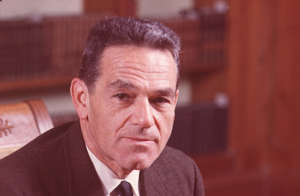
As Larry Faulkner said, “Norman Hackerman has been one of those rare and valued great citizens who helps a large and complex society move from past to future.”
An article by Robert P. Frankenthal in the Summer 2008 issue of Interface.
Norman Hackerman, who died last year at the age of 95, was a giant among giants: a world renowned scientist, an outstanding educator, a highly successful administrator, and a champion for basic research. He was member of ECS for more than 60 years. His research focused on the electrochemistry of corrosion, its mechanism and the processes to prevent or inhibit corrosion. During the more than 50 years he served as an administrator, he continued as a research scientist and an educator, maintaining an active research group and teaching freshman classes. At the same time he served the government, ECS, and other technical societies in numerous capacities.
Marye Anne Fox, chancellor and distinguished professor of chemistry at the University of California, San Diego, summed up his contributions to the nation, as reported in Chemical & Engineering News, “More than any other American, Norman Hackerman’s strong support for investment in basic research was the dominant factor in American science policy over the past 50 years, including the years he served as chairman of the National Science Board.” She further states that as a leader, “his voice was a strong one for the highest ethical principles, imbued with rationality, even when this involved great personal cost.”
Read the rest.


